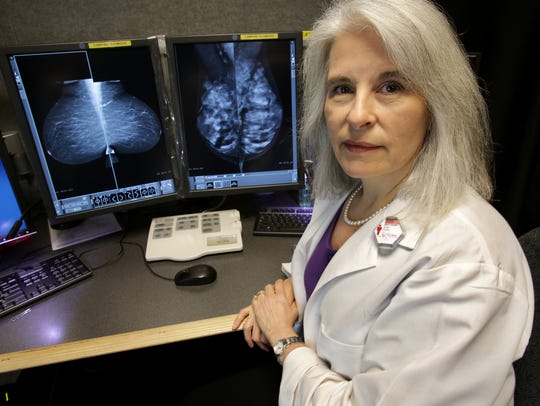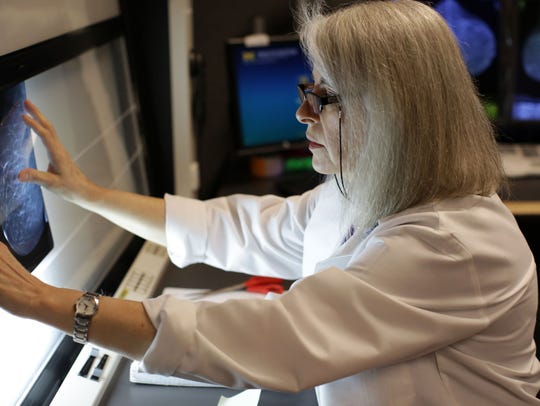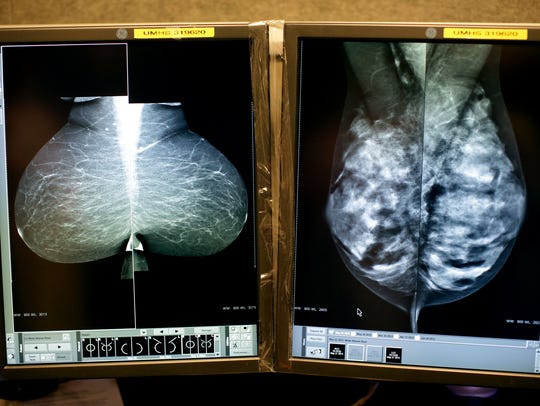New law aims to make breast cancer testing more effective
Women with dense breast tissue — the sort that can hide potentially deadly tumors from routine mammograms — must be notified in writing and encouraged to consider additional tests under a new state law that is effective Monday.

Dr. Renee Wayne Pinsky, who specializes in breast imaging, takes a break from examining scans at the more
While mammograms remain the gold standard for detecting breast tumors, they're less reliable in almost half of women with dense breast tissue. Dense or fibrous tissue shows up as splotches of white on a mammogram — so do tumors.
That will likely surprise many of the millions of women who rely on mammography for catching the earliest signs of cancer, said Nancy Cappello. The Connecticut woman was shocked in 2004, when her gynecologist found a lump — advanced cancer that had already spread to her lymph nodes — just months after a mammogram deemed her cancer-free.
"I'm thinking, 'Why do you think I'm getting my breasts squeezed every year and getting radiation (from mammograms) every year? It's supposed to find my cancer," she said.
Cappello has been fighting for years for mandatory notification laws across the U.S. and established the www.AreYouDense.comweb site to raise awareness about the limits of mammography in dense breast tissue. Inspired by Cappello's efforts, Grand Rapids attorney Teresa Hendricks-Pitsch, pushed for the new Michigan law. She even wrote out arguments for the law in 2011 while hooked up to a chemotherapy drip to fight cancer that had spread to her lymph nodes.

“We’re not going to diagnose all cancers on mammography,” says Dr. Renee Wayne Pinsky, a radiologist who says more
Hendricks said a surgeon who excised her tumor told her it most likely had been growing for years. Hendricks-Pitsch's annual mammograms also missed the cancer.
If women know about the limitations of mammograms in dense breast tissue, they can opt for follow-up screenings — ultrasounds or an MRI, for example, the women said.
Both said their health care providers knew about the presence of dense breast tissue, but no one told them or suggested additional testing or follow-up exams.
"My radiologists knew about it. My doctor knew about it," said Cappello. "Everybody seemed to know about it but me."
In Michigan, Hendricks-Pitsch said some have suggested she file a lawsuit. A change in law makes more sense, she said: "I want other women to have the information I didn't."

A woman gets a mammogram at the U-M center on Friday.
(Photo: Kimberly P. Mitchell/Detroit Free Press)
Exams aren't perfect
Perhaps the first step in understanding is knowing this: Finding cancer in a mammogram is a matter of interpretation — the ability to discern an abnormality from a canvass of threads and splotches and spots in black and white and shades in between.
Dr. Renee Wayne Pinsky, a radiologist at the University of Michigan Comprehensive Cancer Center, likens it to searching for a cotton ball in a snowstorm.
In a breast with fatty, less-dense tissue, the whiteness is more scattered against a gray and black landscape. An anomaly — such as a cotton ball — is easier to spot, said Pinsky.
But trying to read a scan of a dense breast tissue is more like peering through a fierce blizzard, trying to glean from a mostly white background a malignant whiteness.
"We're not going to diagnose all cancers on mammography," said Pinsky, who helped fine-tune some of the language in the law, which was introduced by Sen. Dave Hildenbrand, R-Lowell, who represents Hendricks-Pitsch's district.
Though some lawmakers and health providers raised concerns about the extra time demands on doctors, about insurance coverage and about causing unnecessary worry among patients, Michigan approved the bill in December. Gov. Rick Snyder signed it Jan. 10.
Michigan is among 22 states now with some law addressing raising awareness among women about the limits of mammograms in dense breast tissue.

The Medio-lateral Oblique scan on the left shows a fatty breast compared to the breast on the right, which more
Mammogram reports sent to doctors routinely contain information about breast density, but — without a law — its importance in screening is not always passed along to patients or discussed in a way that it's easily understood, said U-M's Pinsky.
And women with extremely dense breasts may face a twofold increased risk of breast cancer than they would if they had less-dense breasts. But Pinsky and other experts also say dense breast tissue doesn't necessarily justify more testing. On its own, dense tissue is not a cause for alarm.
"If you get the letter, the first thing I would tell you is not to worry (about dense breast tissue). It's a common factor," said Dr. Murray Rebner, chief of breast imaging at Beaumont Hospital in Royal Oak and a past president of the national Society of Breast Imaging.
Rather, it's one of many variables that are sifted into a woman's breast cancer risk calculus, he said. Others include family history, age, the age when a woman began menstruating, and the age when she first gave birth.
If a patient's level of risk warrants more testing, there are several options, including ultrasounds, that use sound waves to peer inside the breast, magnetic resonance imaging (MRI), which uses magnetic fields, or molecular breast imaging, which uses a higher dose of radiation than mammograms but has a high rate of cancer detection.
However, unlike routine mammograms, which are free under federal health reform because they're considered a preventive service, insurers differ on how they cover those tests. Blue Cross Blue Shield of Michigan and Health Alliance Plan, two of metro Detroit's largest insurers, say they cover such tests on a case-by-case basis, for example.
Cappello said the cost shouldn't discourage women from talking to their doctor. It is the doctor, she said, who can help them better understand the risk, sort through pros and cons of follow-up exams and help them work with insurers.
Contact Robin Erb : 313-222-2708, rerb@freepress.com or on Twitter @Freephealth




